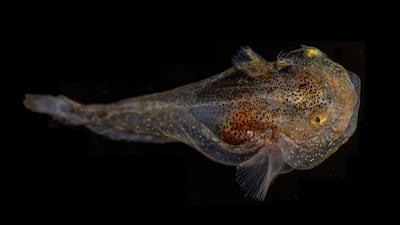A tiny species of fish is able to live in icy Arctic waters thanks to very high levels of "antifreeze" protein in its bloodstream, researchers have found.
Snailfish found on an iceberg habitat in Greenland are able to prevent ice crystals from forming in their cells and body fluid thanks to this remarkable ability, which is rare among sea creatures.
Fish, unlike some other species of reptiles and insects, cannot survive being partially frozen and the findings highlight how marine life can survive in an extreme climate.
The study was led by scientists at the American Museum of Natural History and the City University of New York (CUNY), and published in the journal Evolutionary Bioinformatic.
"Similar to how antifreeze in your car keeps the water in your radiator from freezing in cold temperatures, some animals have evolved amazing machinery that prevent them from freezing", said David Gruber, a biology professor at CUNY’s Baruch College.
Mr Gruber said that scientists did not realise "just how chock-full" of those proteins the fish is and the "effort it was putting into making the proteins”.
The ability of fishes to make these special proteins was discovered nearly 50 years ago, and scientists have since determined that antifreeze proteins are made from five different gene families.

Mr Gruber and co-author John Sparks, a curator in the museum’s department of ichthyology, decided to investigate the antifreeze proteins of the juvenile variegated snailfish, Liparis gibbus.
They were initially attracted to the remarkable fish because of its biofluorescence, which allows it to glow green and red in the dark Arctic waters.
Biofluorescence, the ability to convert blue light into green, red, or yellow light, is rare among Arctic fish and the snailfish is the only polar fish reported to biofluoresce.
Upon further investigation of the biofluorescent properties of snailfish, the researchers found two different types of gene families encoding for antifreeze proteins.
The snailfish genes have the highest expression levels of antifreeze proteins yet observed, scientists say.

However, researchers are also concerned that the fish may struggle to adapt to rapidly warming ocean temperatures caused by climate change.
They say that the Arctic Ocean could be largely free of ice within the next three decades if the current rate of warming continues.
“Arctic seas do not support a high diversity of fish species, and our study hypothesises that with increasingly warming oceanic temperatures, ice-dwelling specialists such as this snailfish may encounter increased competition by more temperate species that were previously unable to survive at these higher northern latitudes,” Mr Sparks said.


